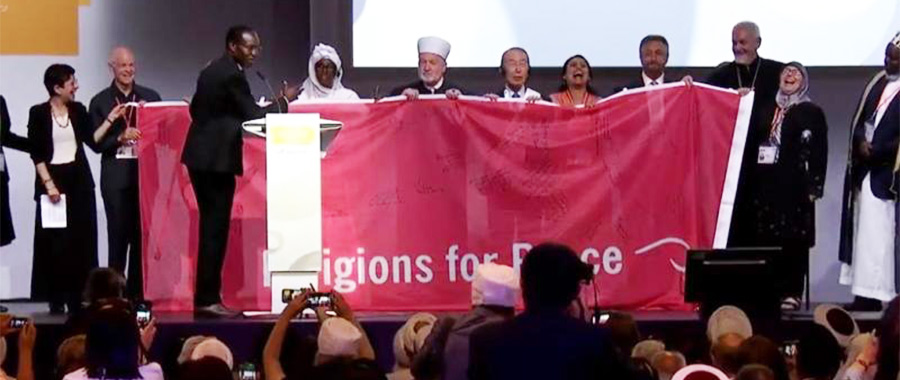The Bahá’í Faith, a religion founded in the mid-19th century, espouses principles that promote unity, peace, and service to humanity. One significant manifestation of these ideals is the election of Bahá’í representatives to esteemed bodies such as the World Council of Religions for Peace (WCRP). This council aims to foster interfaith dialogue and collaboration among various religious traditions, highlighting a vital intersection of faith, diplomacy, and community service.
As the global landscape becomes increasingly intertwined, the role of religious leaders in addressing conflicts, promoting social justice, and advocating for peace is paramount. This serves as a backdrop to understanding the essential contributions a Bahá’í representative can provide to the WCRP.
Firstly, it is pertinent to elucidate the fundamental Bahá’í teachings that inform a Bahá’í’s approach to interfaith collaboration. The core tenets of the Bahá’í Faith include the oneness of humanity, the harmony of science and religion, and the importance of universal education. These principles create a robust foundation for engaging with representatives from diverse faiths, fostering an environment conducive to constructive dialogue.
1. **The Oneness of Humanity**: In the Bahá’í worldview, all humans are regarded as members of one global family. This teaches that diversity should not be a source of conflict but rather a means to enrich the collective experience. A Bahá’í who assumes a position in the WCRP does so with the intent to cultivate understanding among differing religious traditions, emphasizing shared values that transcend sectarian divides.
2. **The Harmony of Science and Religion**: Bahá’ís believe that science and religion are complementary forces that can lead humanity toward greater understanding and cooperation. This perspective is vital in dialogues concerning ethical considerations in biotechnology, climate change, and social justice. A Bahá’í representative can facilitate discussions that integrate empirical research with spiritual insights, leading to informed decision-making.
3. **Universal Education**: Education is paramount in the Bahá’í Faith, as it contributes to the eradication of prejudice and the promotion of justice. A Bahá’í elected to the WCRP will prioritize educational initiatives that foster understanding and the pursuit of knowledge. Through workshops, youth programs, and public discussions, they can help dismantle barriers and create a more informed citizenship.
In addition to these teachings, the Bahá’í approach to conflict resolution and peacebuilding can provide invaluable strategies at the WCRP. A Bahá’í emphasizes consultation as a means of arriving at decisions collectively. This practice encourages open dialogue, where all voices are heard and respected, an essential quality when dealing with delicate interfaith issues.
4. **Consultative Decision Making**: The Bahá’í principle of consultation encourages a spirit of collaboration and collective responsibility. This methodology invites representatives of various faiths to engage in discussions without fear of judgment, allowing for a richer exploration of ideas and solutions. In the WCRP context, this could mean addressing contentious issues such as human rights violations and war through collaborative engagement rather than confrontational debate.
5. **Social Action**: The commitment to social action is a practical application of Bahá’í teachings. A Bahá’í currently serving on the WCRP will likely take initiatives that bridge the teachings of various religious traditions with actionable community projects. This could see the facilitation of dialogues addressing pressing concerns such as poverty alleviation, gender equality, and environmental sustainability from a multifaith perspective.
Another area ripe for exploration is the impact of such representation on the broader Bahá’í community and its global perception. The presence of a Bahá’í leader at an interfaith council such as the WCRP is a testament to the faith’s commitment to collaboration and peace. It sends a clear message about the role of religion in society and the necessity of cooperation among world religions for the common good.
6. **Influencing Global Narratives**: A Bahá’í representative in such a significant council can shift global narratives surrounding religion. By actively participating and sharing the Bahá’í ethos of unity and service, they have the potential to redefine how faith is perceived, challenging stereotypes and promoting a more nuanced understanding of religious diversity.
The Bahá’í experience within the WCRP also raises essential questions regarding the future of interreligious dialogues. In an era marked by polarization, the necessity for mutual understanding and peaceful coexistence has never been more pressing. A Bahá’í leader contributing to this dynamic does not merely act as a representative of their faith; they embody a broader aspiration for global harmony.
7. **Future Directions in Interfaith Collaboration**: As challenges evolve, so too must the strategies employed in interfaith settings. The insights gathered through the efforts of a Bahá’í in the WCRP can illuminate pathways toward future collaboration among religious leaders, reinforcing the importance of adaptability in dialogue, empathy, and shared commitments toward peace.
In conclusion, the election of a Bahá’í representative to the World Council of Religions for Peace exemplifies the commitment to unity, understanding, and activism championed by the Bahá’í Faith. As they work alongside leaders of various faith backgrounds, the impact of their contributions extends far beyond individual initiatives. They embody the essence of service, principles of equity, and the ceaseless pursuit of peace, profoundly affecting both their faith community and the wider religious landscape.
